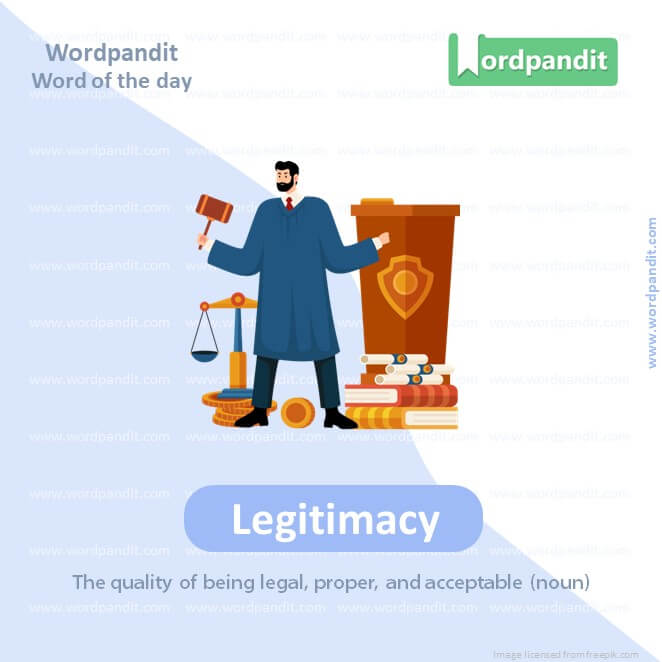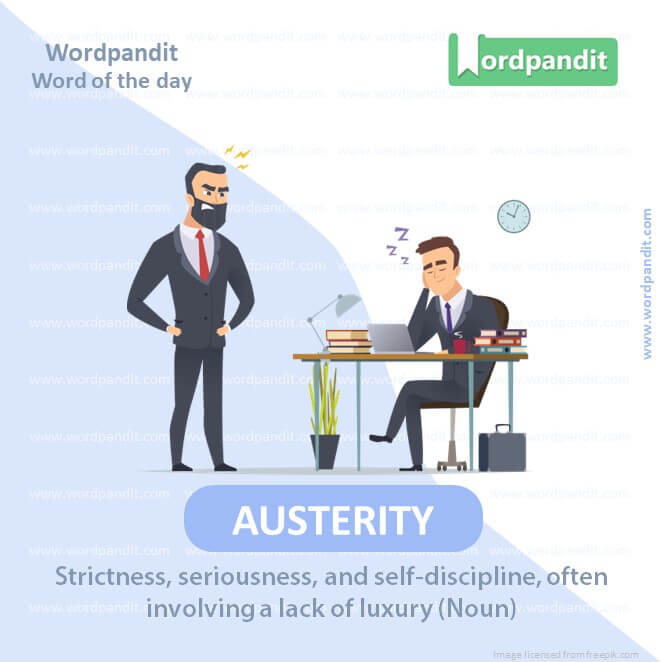Daily Vocabulary Words: List of Daily Used Words
Hi there. Welcome to this special section @ Wordpandit.
Our endeavour here is straightforward: highlighting important daily vocabulary words, you would encounter in The Hindu. This is your repository of commonly used words; essentially, we are posting a list of daily used words. Hence, this has significant practical application as it teaches you words that are commonly used in a leading publication such as The Hindu.
Visit the website daily to learn words from The Hindu.

WORD-1: Legitimacy
CONTEXT: What they are striking at is the legitimacy of the liberal, democratic process in which elections lead to certain winners.
SOURCE: The Hindu
Explanatory Paragraph: Legitimacy is like when everyone agrees that the rules of a game are fair. It means that something is recognized as right and acceptable by most people or by the rules.
Meaning: The quality of being legal, proper, and acceptable (noun).
Pronunciation: luh-JIT-ih-muh-see
Synonyms: legality, validity, lawfulness, authenticity, rightfulness
Usage Examples:
1. The legitimacy of the election results was questioned.
2. She challenged the legitimacy of the new policy.
3. The legitimacy of his claim to the throne was recognized.
4. He argued for the legitimacy of the protest.

WORD-2: Exerting
CONTEXT: Left-wing populists would argue that the masses, the general public, the working class were not being allowed to influence public policy because the rich, the political elites, dominated by capitalist interests, were exerting undue influence on the system.
SOURCE: The Hindu
Explanatory Paragraph: Exerting is like when you use all your strength to push a heavy toy box across the room. It means applying force or effort to do something.
Meaning: Applying or using force. effort, or influence (verb).
Pronunciation: ig-ZURT-ing
Synonyms: applying, exercising, wielding, deploying, utilizing
Usage Examples:
1. He was exerting considerable pressure to open the jar.
2. She is exerting herself in her new job.
3. The company is exerting influence in the industry.
4. They were exerting all their energies to complete the project on time.

WORD-3: Inclusion
CONTEXT: But the right-wing version in the world now also asks a powerful question, which is whether the liberal, democratic project of inclusion is legitimate.
SOURCE: The Hindu
Explanatory Paragraph: Inclusion is like making sure everyone at school gets to play in the game, no matter what. It means making sure everyone is included and can be a part of something.
Meaning: The act of including or being included within a group or structure
(noun).
Pronunciation: in-KLOO-zhun
Synonyms: incorporation, integration, involvement, participation, inclusion
Usage Examples:
1. The inclusion of new members made the team stronger.
2. Her policies promoted inclusion in the workplace.
3. The program was praised for its inclusion of diverse perspectives.
4. Inclusion in the discussion is open to everyone.

WORD-4: Decimation
CONTEXT: In Pacific Affairs, I argue with Seyed Hossein Zarhani that there has been a systematic decimation of public institutions in three ways: one, by interpreting rules differently; two, by changing rules incrementally, such as by bringing in a Bill (in India) regulating the appointment of the Chief Election Commissioner
SOURCE: The Hindu
Explanatory Paragraph: Decimation is like when you have ten cookies and someone takes away nine of them. Originally, it meant removing a large part of something, often in a harsh way.
Meaning: The act of destroying or removing a large portion of something
(noun).
Pronunciation: des-ih-MAY-shun
Synonyms: devastation, destruction, annihilation, reduction, slaughter
Usage Examples:
1. The species faced decimation due to habitat loss.
2. The team suffered decimation after the severe penalties.
3. Economic policies led to the decimation of the industry.
4. The decimation of the forest was a serious environmental concern.

WORD-5: Austerity
CONTEXT: the powerful appeal is of a country whose economic crisis has been so long-standing that is allows someone like Mr. Milei to come and say, everyone has let you down and 40 years of austerity measures periodically by the International Monetary Fund have made your lives terrible.
SOURCE: The Hindu
Explanatory Paragraph: Austerity is like when your family decides to save money by not buying toys or going out to eat for a while. It means being very strict in managing money and resources.
Meaning: Strictness, seriousness, and self-discipline, often involving a lack of luxury (Noun).
Pronunciation: aw-STER-ih-tee
Synonyms: severity, sternness, simplicity, frugality, strictness
Usage Examples:
1. The government implemented austerity measures to reduce debt.
2. He lived a life of austerity and minimalism.
3. The austerity of the building reflected the architect’s style.
4. Austerity measures were not popular among the citizens.
WORD-6: Preliminary
CONTEXT: Our preliminary research suggests that you need three things: a narrative of being a strong democratic leader; a clear message of being secular and not ethno-nationalistic; and perhaps attending to welfare goals.
SOURCE: The Hindu
Explanatory Paragraph: Preliminary is like when you do a practice run before the real race to make sure everything works fine. It means something that happens before the main event to prepare for it.
Meaning: Occurring at the beginning of something; introductory or preparatory (adjective).
Pronunciation: pre-LIM-ih-nair-ee
Synonyms: initial, introductory, preparatory, prior, initial
Usage Examples:
1. Preliminary results indicate a possible breakthrough.
2. They conducted a preliminary survey before the full study.
3. The preliminary meeting set the stage for formal negotiations.
4. Preliminary sketches helped visualize the final project.
WORD-7: Presentist
CONTEXT: One of the dangers of any political commentary is that we have a presentist bias.
SOURCE: The Hindu
Explanatory Paragraph: Presentist is when people think about the past like it was just like today. They use what they know now to make guesses about what happened long ago.
Meaning: An attitude toward the past dominated by present-day attitudes and experiences (noun).
Pronunciation: PREZ-uhn-tist
Synonyms: contemporary bias, current-day bias, modern bias
Usage Examples:
1. The historian was criticized for his presentist view of the events.
2. Presentist interpretations can lead to misunderstandings of historical contexts.
3. Avoiding a presentist perspective is crucial in accurate historical analysis.
4. His book challenges the presentist bias in traditional narratives.
WORD-8: Authoritarianism
CONTEXT: In the 1970s, Latin America saw a collapse of democratic systems and the rise of bureaucratic authoritarianism.
SOURCE: The Hindu
Explanatory Paragraph: Authoritarianism is like
when there is one leader in a game who makes all the rules and doesn’t let anyone else give ideas or change the rules. It means having strict control over what other people can do.
Meaning: The enforcement or advocacy of strict obedience to authority at the expense of personal freedom (noun).
Pronunciation: uh-thawr-ih-TAIR-ee-uh-nizm
Synonyms: dictatorship, totalitarianism, despotism, tyranny, autocracy
Usage Examples:
1. The regime was known for its authoritarianism.
2. He wrote a thesis on the rise of authoritarianism in modern politics.
3. Authoritarianism often leads to a lack of democratic processes.
4. The protest was against the government’s authoritarianism.
WORD-9: Volatility
CONTEXT: In 2008, Pradeep Chhibber and I found that Indian States that have less fiscal space experienced higher electoral volatility and higher rates of anti-incumbency.
SOURCE: The Hindu
Explanatory Paragraph: Volatility is like when the weather changes quickly from sunny to rainy and back again. It means something that changes often and unpredictably.
Meaning: The characteristic of being subject to rapid or unexpected change (noun).
Pronunciation: vol-uh-TIL-ih-tee
Synonyms: instability, unpredictability, variability, fluctuation, changeability
Usage Examples:
1. The stock market is known for its volatility.
2. Price volatility makes planning difficult.
3. The volatility in his mood made him difficult to work with.
4. Economic volatility affects global markets.
WORD-10: Antiquity
CONTEXT. the Yangtze is modern China’s lifeline while retaining its antiquity.
SOURCE: The Hindu
Explanatory Paragraph: Antiquity is like very old treasures from a long time ago, like castles or ancient statues. It refers to the times in history that are very far back.
Meaning: The ancient past, especially the period before the Middle Ages (noun).
Pronunciation: an-TIK-wih-tee
Synonyms: ancient times, the ancient past, classical age, olden times, bygone days
Usage Examples:
1. The museum houses artifacts from antiquity.
2. Scholars study texts from antiquity to understand the past.
3. The ruins are a remnant of Roman antiquity.
4. He has a deep interest in the philosophy of antiquity.
Vocabulary Meaning
In the ocean of language learning, ‘vocabulary meaning’ is akin to the colorful coral reefs that add depth and vibrancy to communication. Yet, infusing our interactions with this vibrancy is often a challenge for many language learners. The crux lies in effectively deciphering and employing the ‘vocabulary meaning’.
Learning ‘vocabulary meaning’ isn’t about merely gluing words to their definitions. It’s about forming a deep understanding and connection with these words that transcends rote learning. To gain a comprehensive grasp of ‘vocabulary meaning’, one needs to navigate beyond textbook definitions and commit to exploiting diversified resources such as novels, films, music, articles, and digital content. This allows one to encounter vocabulary in a variety of contexts and actual usage, giving deeper insight into their meaning.
However, understanding ‘vocabulary meaning’ involves another essential aspect—memory retention. Techniques such as spaced repetition and the Leitner System offer effective methodologies to maintain and consolidate the ‘vocabulary meaning’. Additionally, leveraging mnemonic strategies can help etch words into your memory by linking them with unique stories or imagery that are personal and easily recallable.
Another way of mastering ‘vocabulary meaning’ is by immersing yourself in the language. Engage in regular conversations with native speakers if possible or utilize language exchange platforms to practice your skills. This not only bolsters your understanding of how the vocabulary is used but also helps articulate the ‘vocabulary meaning’ in the societal and cultural contexts.
In conclusion, gaining a robust grasp of ‘vocabulary meaning’ is a journey rather than an end goal. It requires dedication, perseverance and most importantly, a multi-faceted approach that includes diversified resources, effective memory strategies, and real-life application. With these strategies in place, the depths of ‘vocabulary meaning’ are no longer daunting but become an enchanting exploration of language.







